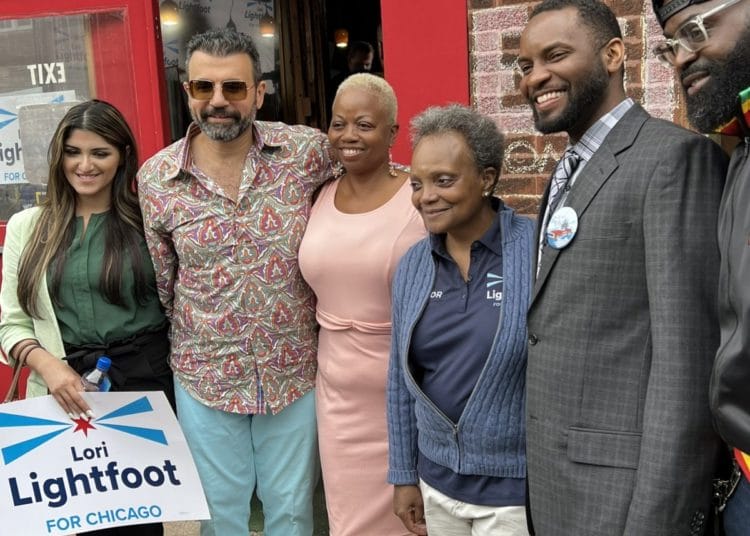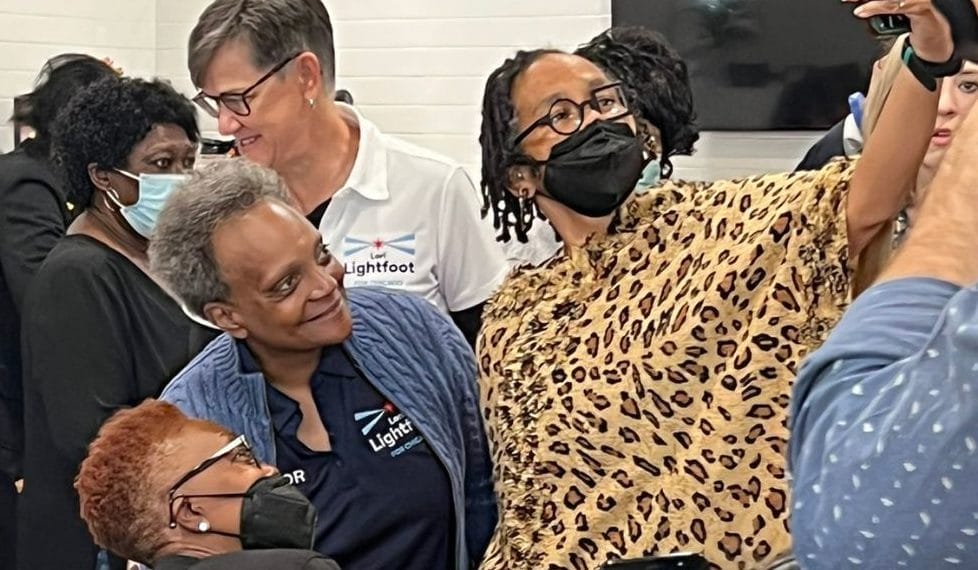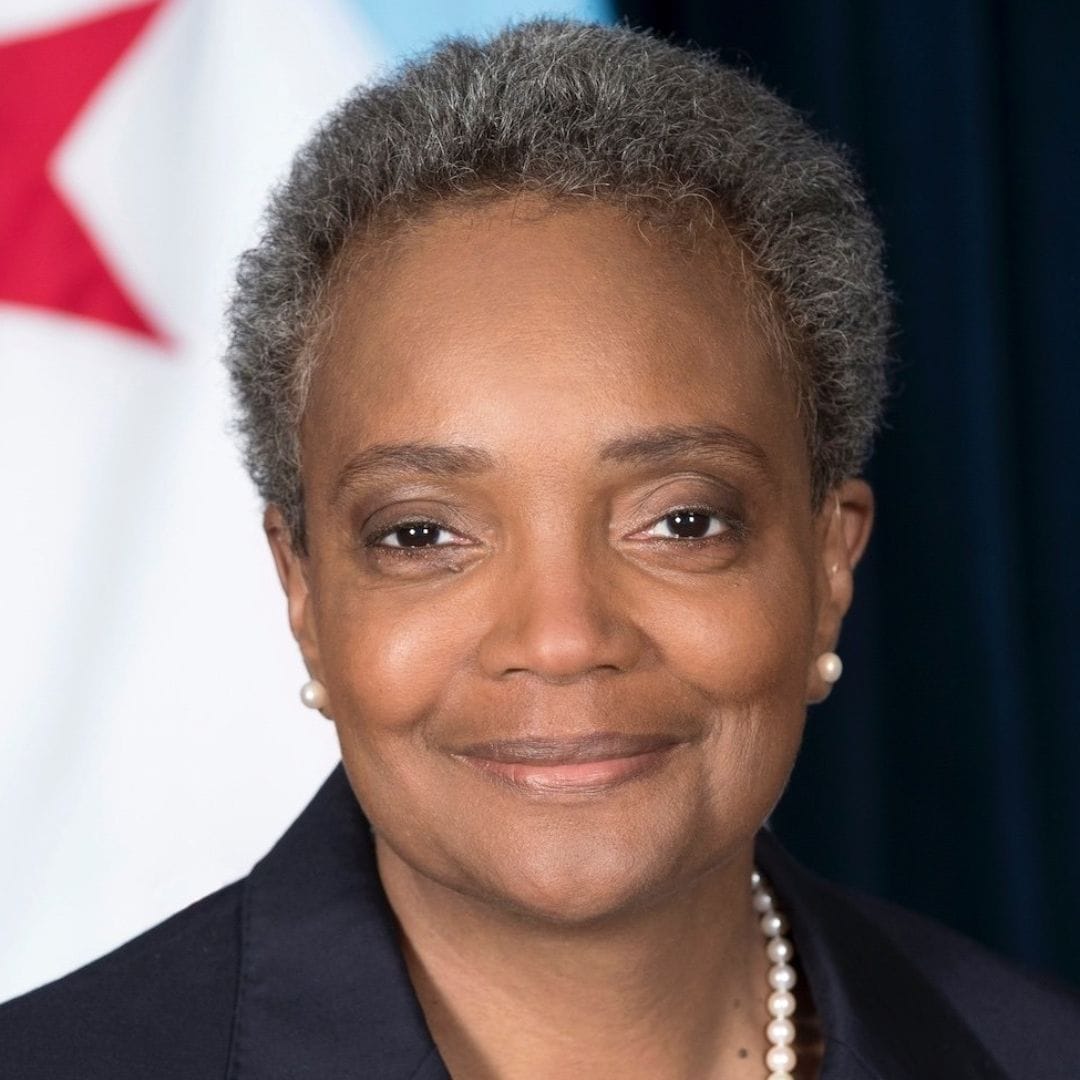After a difficult first term in office, Mayor Lori Lightfoot finally kicked off her re-election campaign this week, visiting neighborhoods across the city to bring her tough message on crime and economic development directly to voters as waning Black support threatens her future at City Hall.
As Chicago’s first Black female mayor, Lightfoot steered the nation’s third largest city through a paralyzing pandemic without a script. But shootings, unsolved murders, carjackings and ambitious political candidates stand in her way of winning a second term.
One day after launching her reelection campaign in the River North neighborhood, Lightfoot visited the iconic Brown Sugar Bakery in Greater Grand Crossing as part of a five-neighborhood tour. She shook hands with customers and posed with others for selfies. It was a gesture that aimed to soften her image as a difficult mayor who has been accused of using an abrasive style of leadership that has at times put Lightfoot in a negative spotlight.
She came to Brown Sugar Bakery with her wife Amy Eshleman, as the couple talked about the bakery’s signature caramel cake. But owner Stephanie Hart and several business owners on 75th Street gave Lightfoot something even sweeter: an endorsement.

“I can only imagine what she can accomplish in a second term. After getting us through this pandemic, she is tough as nails,” said Hart. “We need to keep our city on the right track by reelecting Mayor Lori Lightfoot.”
Ariel Brown, co-owner of the 41-year-old Original Soul Vegetarian restaurant said, “We support this mayor based on everything she’s been doing for this city. They didn’t believe she could do it, but she has been doing it. For that reason, we support her.”
Noticeably absent from the event was Lem’s Barbeque, a 67-year old institution on 75th. Sources told the Crusader Lem’s did not know about Lightfoot’s visit until the last minute. The Crusader was unable to reach Carmen Lemons to confirm those details.
In a speech, Lightfoot vowed to keep Police Superintendent David Brown and touted her $750 million South/West Invest initiative to reenergize Chicago’s Black and brown neighborhoods that took a beating before and during the pandemic.
“Over the last three years, we spent a lot of time here listening to the businesses, listening to the residents and making sure we were doing things from a policy perspective that really reflected the experience of people in this community,” Lightfoot said.
“I’ve been grateful for the support but also the counsel from the small business owners in this corridor.”
“I like her, she just needs a little more help,” said Sam Wallace, 71, who has worked at A&S Beverage Wine and Spirits down the street. ‘She’s doing the best she can. That’s all I can say.”
But several business owners who didn’t want their names in this story told the Crusader they don’t believe Lightfoot’s message and question her intentions.
They said they are tired of police officers not responding to their calls as shootings and crime fester in the business district. One owner said Lightfoot is more concerned about getting re-elected than helping Black neighborhoods.
“I’m not buying her game one bit,” the owner said. “I’m so tired of all her talk. That’s all she’s about.”
One Greater Grand Crossing resident, Cynthia Collier, said Lightfoot did a good job in her first term.
“I think she handled the pandemic very well. We were thoroughly informed. I was pleased with the way the city was being run and handled.”
Lightfoot on Tuesday, June 7, launched her campaign with a 2-minute, 35-second video message where the mayor says,
“When we fight for change, confront a global pandemic, work to keep kids in school, take on guns and gangs, systemic inequality and political corruption only to have powerful forces try and stop progress for Chicago, of course I take it personal — for our city.
“Change doesn’t happen without a fight. It’s hard. It takes time. And I’ll be the first to admit: I’m just not the most patient person. I’m only human. And I guess sometimes, it shows. But just because some may not always like my delivery, doesn’t mean we’re not delivering.”
Sources tell the Crusader that Lightfoot in recent weeks visited several prominent Black churches in the city, including Trinity United Church of Christ in Washington Heights and Apostolic Church of God in Woodlawn.
As Lightfoot campaigns for the Black vote, she faces a growing field of Black mayoral candidates who seek to unseat her. Her opponents are going after disillusioned Black voters who have been offended by Lightfoot’s leadership style and her crime initiatives that many believe cater to downtown and the North Side.
Those opponents include Alderman Roderick Sawyer (6th), businessman Willie Wilson, State Representative Kam Buckner, Alderman Raymond Lopez, former Chicago Public Schools chief Paul Vallas, and LGBTQ media consultant DJ Doran.
Alderman Sophia King (4th) and State Representative La Shawn Ford are reportedly considering joining the mayoral race.
There is talk that a large field of Black candidates would split the Black vote and give Lightfoot a victory by default. A split Black vote could also help Vallas or another candidate win the mayoral race. A candidates must win 50 percent of the Chicago vote to win the race outright to avoid a runoff, which includes the top two winners in the Primary.

Lightfoot announced her run for a second term at the Ivy Room in the River North neighborhood, blocks away from where she celebrated after she emerged as a top candidate in the mayoral Primary that sent her into a successful runoff race against Toni Preckwinkle.
After campaigning as a reformer and outsider, Lightfoot swept Chicago’s 50 wards in a stunning landslide victory that led many to believe the city’s political machine that disenfranchised Blacks and minorities for years, was finally over.
Today, Lightfoot is an embattled and vulnerable incumbent who needs a voter base to win a second term. But many white, Latino and Black voters have grown disillusioned with her leadership as crime spreads across the city, impacting both poor and affluent neighborhoods. A recent survey showed that Lightfoot’s approval rating dipped below 30 percent.
Perhaps Lightfoot’s biggest challenge is winning over voters in Chicago’s Black community.
Blacks overwhelmingly supported Lightfoot when she was a relatively unknown mayoral candidate who overcame concerns that she would be a leader for Chicago’s white, affluent residents on the North Side when she ascended to the fifth floor at City Hall. Those concerns have been renewed as the clearance rate for murders on the South Side remains low while Lightfoot beefs up security to protect Chicago’s Loop and ritzy Mag Mile from crime.
Lightfoot broke several campaign promises that included reopening the mental health clinics that Mayor Rahm Emanuel closed in 2012. She also fought against an elected school board and some Blacks are still angry that police allowed many Black businesses to be looted during the George Floyd riots while Lightfoot protected downtown with trucks, national guardsmen and raised bridges.
There was also the wrongful police raid of Anjanette Young’s home, where Lightfoot’s administration tried to block CBS 2 Chicago from airing the video. Lightfoot initially said she had no knowledge of the raid but later reversed course.
An Inspector General report showed Lightfoot was told in November 2019 that the raid was “pretty bad” and she was briefed in detail about what happened to Young. The police officers involved in that raid were never disciplined.
Adding to Lightfoot’s woes is her fragmented relationship with the city’s 20-member Black Caucus.
When Lightfoot had a heated confrontation with Alderman Jeanette Taylor (20th), many Blacks called radio station WVON to voice their anger at the mayor, with some calling her a bully. Last week, Alderman Sawyer (6th) in announcing his run for mayor called Lightfoot “mean spirited.”
While most Black aldermen fought to rename Lake Shore Drive after Jean Baptiste Pointe DuSable in 2020, Lightfoot did not support the proposal but the measure passed anyway.
Last month 10 Black aldermen voted against moving Lightfoot’s curfew up to 10 p.m. from 11 p.m.
Alderman Michael Scott (24th) abruptly resigned last month to take a job with Cinespace studios. The Sun-Times reported that Scott was disappointed when Lightfoot appointed Rosa Escareño as the new Chicago Park District superintendent last year rather than lead a national search to fill the role. Scott, who worked for the park district for 12 years before joining the City Council, reportedly saw the opportunity as a dream job.
Lightfoot does have a handful of Black aldermen as allies. They include Michelle Harris (8th), Derrick Curtis (18th), Jason Ervin (28th), Chris Taliaferro (29th) and Emma Mitts (37th).
Lightfoot has accused the media and critics of attacking her because she is a Black woman who’s being held to a different standard than past male Chicago mayors.
“I don’t look or sound like any other mayor we’ve ever had before, and I’ve had to fight to get a seat at the table,” Lightfoot said in a YouTube video announcing her re-election.
“And I’ll be the first to admit, I’m just not the most patient person. I’m only human. And I guess sometimes it shows,” Lightfoot said in the video, acknowledging some Chicagoans don’t like her style.






